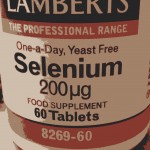 That selenium prevents cancer is evidenced in the nutritional literature. The pivotal study on cancer was performed by Clark et al in 1996 (here) and in many ways this was a landmark study in nutrition. The researchers1 investigated the association between cancer and selenium and found that subjects consuming 200 ug per day of selenium yeast for an average of 4.5 years had a decreased risk of lung, colon, and prostate cancer of 54, 37 and 42 %, respectively. Interestingly, the findings of this study have gone virtually unreported in the mainstream media and are of no interest to the medical establishment. Studies using animals models and clinical trials support the data collected by Clark and provide evidence of the mechanisms by which dietary selenium might be beneficial. In this regard, selenium supplementation may be protective because it is able to reverse long-term selenium deficiencies. Studies on minerals intakes show that intakes of selenium are too low in Western nations, and this results in insufficient selenium plasma levels.
That selenium prevents cancer is evidenced in the nutritional literature. The pivotal study on cancer was performed by Clark et al in 1996 (here) and in many ways this was a landmark study in nutrition. The researchers1 investigated the association between cancer and selenium and found that subjects consuming 200 ug per day of selenium yeast for an average of 4.5 years had a decreased risk of lung, colon, and prostate cancer of 54, 37 and 42 %, respectively. Interestingly, the findings of this study have gone virtually unreported in the mainstream media and are of no interest to the medical establishment. Studies using animals models and clinical trials support the data collected by Clark and provide evidence of the mechanisms by which dietary selenium might be beneficial. In this regard, selenium supplementation may be protective because it is able to reverse long-term selenium deficiencies. Studies on minerals intakes show that intakes of selenium are too low in Western nations, and this results in insufficient selenium plasma levels.
Selenium prevents cancer therefore only in those already deficient in the mineral. Based On this hypothesis it is not unreasonable to postulate that cancer may be one of the diseases that develops from a selenium deficiency. Selenium is generally well absorbed, but questions remain as to whether a balanced diet is able to provide a high enough selenium intake. This is because extensive agriculture has depleted the soils of selenium and this lowers the selenium content of food. Selenium is an essential mineral in humans because it is required by the selenoproteins, the most widely researched being the antioxidant enzyme glutathione peroxidase. Low levels of glutathione peroxidase may play a causative role in the formation of certain types of cancer and research shows an inverse association between glutathione peroxidase and mortality. Supplemental selenium can raise plasma levels of selenium, and this is turn raises cellular levels of glutathione peroxidase. In addition selenium may have other nutritional roles that have not been uncovered.
RdB
